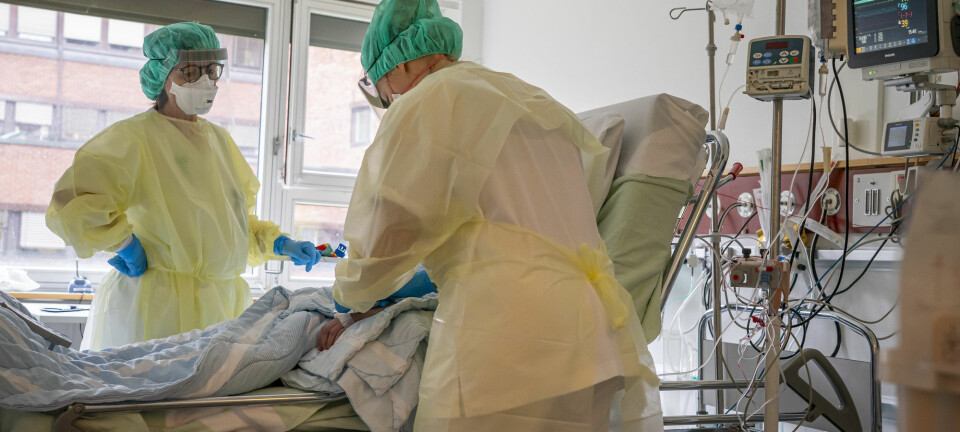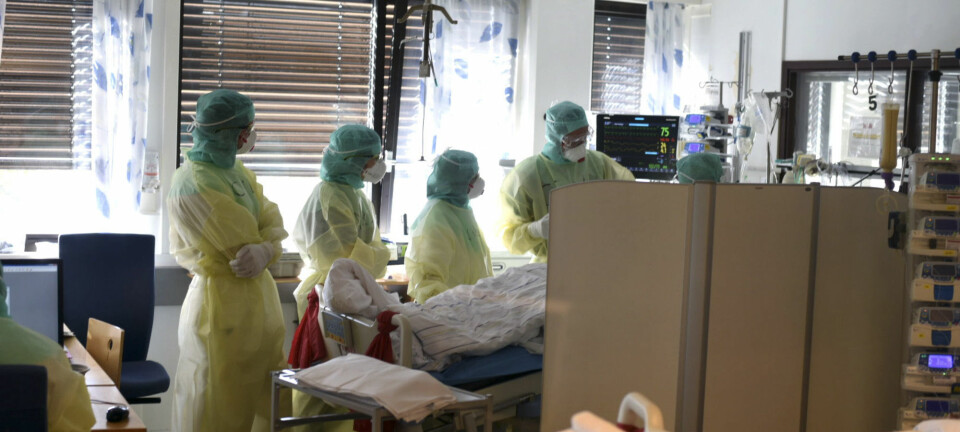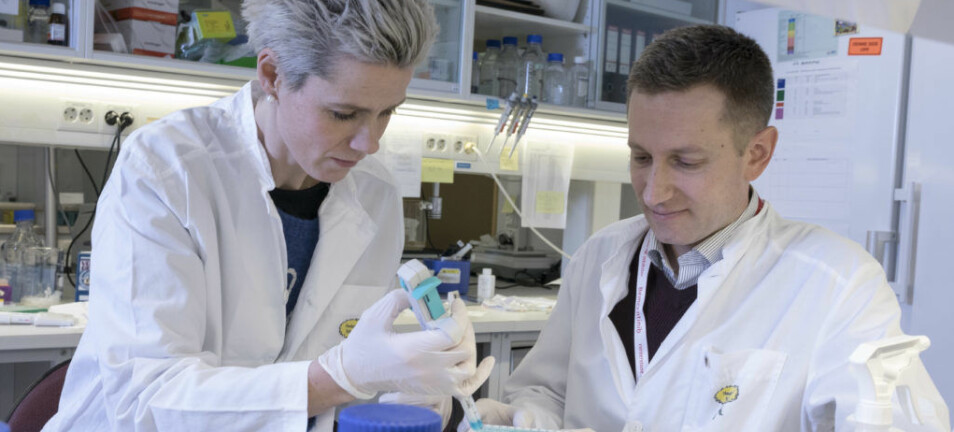
Smokers and people who are overweight should be among the first to get the COVID-19 vaccine, researchers believe
There is a strong and clear link between obesity and getting seriously ill from COVID-19. The same goes for smoking. A new Norwegian-British study confirms these links.
For the first time, researchers have been able to establish a probable causal link between being overweight and severe COVID-19.
A Norwegian and British research group has established the link, which has now been published in the journal Circulation.
The same is true for smoking and severe COVID-19.
Excluded other possible causes
Although studies in other countries have found similar correlations, they have not been able to point to a causal connection.
The problem researchers have faced is that when they only observe a correlation, they can’t exclude other factors that could also have an effect. That means they haven’t been able to say for certain that being overweight or smoking itself is the reason why someone develops a severe case of COVID-19.
Other factors that could put someone at risk of getting seriously ill from the coronavirus include poorer nutrition, less physical activity, type 2 diabetes or high blood pressure.
Researchers in Norway and the United Kingdom have now conducted a new type of study where they have tried to eliminate these other possible causes.
Studied hundreds of thousands
After studying data from hundreds of thousands of people who participated in studies on the relationship between smoking, being overweight and severe COVID-19, the researchers are no longer in doubt.

Erik Solligård, Jan Kristian Damås and Tormod Rogne from the Norwegian University of Science and Technology (NTNU) believe this is the first study to show that there is a probable causal link between being overweight and developing a severe course of COVID-19 and sepsis (blood poisoning). The same is true for smoking.
Jøran Hjelmesæth heads the Morbid Obesity Centre, South-Eastern Norway Regional Health Authority, Vestfold Hospital Trust. In an email to sciencenorway.no, he said he was impressed by the study:
“This is an important and impressive piece of work,” he wrote.
Positive relationship between weight and disease
The researchers didn’t set a hard limit as to what they considered overweight. They simply saw there was a positive and linear relationship between BMI (body mass index) and COVID-19.
Overweight people were at greater risk of becoming seriously ill than people who have a normal weight.
Those who were most overweight or obese had the greatest risk.
Link to sepsis research
The three Norwegian researchers behind the study all belong to the Gemini Centre for Sepsis Research at NTNU.
Healthcare professionals see that many patients with severe COVID-19 develop sepsis (blood poisoning).
This is a serious infection that makes patients very ill. Sepsis occurs when bacteria enter the bloodstream and the body's immune system overreacts. This damages the body's organs and can cause organ failure. Sepsis is one of the most common causes of death in Norwegian hospitals.
The researchers started their study by looking at various risk factors for developing COVID-19 and sepsis.
Smokers come to hospital more often
In the past, researchers have reported conflicting results when it comes to smoking as a risk factor for COVID-19.
Consequently, the Norwegian Institute of Public Health (NIPH) removed smoking from the list of risks of developing a serious course of COVID-19 in April. The reason was that studies had not shown a definite connection between smoking and developing a severe course of COVID-19.
One study even suggested that smoking can be beneficial if you have COVID-19.
Researchers at NTNU can now say that smokers are not protected from severe COVID-19 and hospitalization.
Instead, they found a clear and distinct connection between smoking and developing a serious course of the disease.
Genetic information from participants
The researchers relied on a completely new design for their study, called a "Mendelian randomization study".
The researchers said this approach helps them eliminate other possible effects, such as risks associated with high blood pressure.
Instead of using the patients' observed weight to establish connections, the researchers used data from the genes of the study participants.
A natural experiment
Our genes explain about 6 per cent of the variation in our BMI. The genetic variations from your biological mother and father are randomly inherited at conception.
“A fertilized egg essentially creates a natural experiment,” Rogne said. “It’s random who is genetically predisposed to become overweight and who is not.”
The advantage of this study design is that they have been able to look at people who are genetically predisposed to being overweight, regardless of whether they smoke or are not physically active, for example.
Thus, the two groups — the genetically overweight and the non-genetically overweight — are the same, with the exception of weight.
Genes explain only a little
This research method is not without its problems, because our genes don’t completely determine what we weigh.
“Being overweight is not just a result of genetics. It also has to do with how much we eat and move. Genetics can only explain some of the problem, perhaps only as little as around 6 per cent of the reason for people being overweight,” Damås said.
The researchers have compensated for the fact that genes have a relatively small effect on weight by studying lots of people, which gives them statistically stronger results.
Less obesity and smoking
When the British Prime Minister Boris Johnson got COVID-19, he realized that he had a problem with weight. Johnson is now leading a campaign against obesity in the UK.
The Norwegian researchers believe this is the right way to go.
If Norway is able to reduce the incidence of smoking and being overweight, it will greatly help to reduce the number of patients who develop severe COVID-19 and sepsis.
At the same time, researchers realize that this is a difficult goal which takes time.
Should be prioritized in the vaccine queue
The researchers have identified a completely different short-term measure they believe will be necessary:
Smokers and people who are overweight should be given priority when the vaccine for COVID-19 is available.
“The knowledge we have gained about the connection between being overweight and smoking on the one hand and serious COVID-19 disease on the other should help encourage health authorities to prioritize these patients, because they have the greatest risk of becoming seriously ill from the virus,” Solligård said.
“We can’t just say they have to lose weight and stop smoking,” he said.
When the vaccine arrives, it will be important to first vaccinate people at risk and their relatives, he believes.
Must be seen as at-risk patients
These findings are supported by Jøran Hjelmesæth in his role as head of the Morbid Obesity Centre, South-Eastern Norway Regional Health Authority, Vestfold Hospital Trust. He is also a professor at the University of Oslo.
Hjelmesæth believes that this study, combined with other new studies, should lead health authorities to consider people who are obese as having a higher risk of developing a severe course of COVID-19.
He thinks these individuals should be prioritized in the vaccine queue, after the elderly.
“An increasing number of studies have confirmed that people who are obese have a higher risk of a serious course of COVID-19, but the results of this study suggest that increasing BMI may be a direct cause of this,” he wrote in an email.
“The results support the importance of implementing structural measures to reduce and prevent the incidence of obesity in society, and that the health service be prepared to perceive the obese as at-risk patients for COVID-19 so they are treated accordingly,” he wrote.
Non-traditional method
Bård Erik Kulseng, head of the Regional Centre for Obesity Research and Innovation at St. Olavs Hospital in Trondheim, also thinks this is an interesting study.
The method used by the researchers is based on the identification of a large number of genes that can affect the development of obesity, which Kulseng finds intriguing.
“We know that people who carry many of the genes that predict obesity seem to tolerate our modern lifestyle the worst. These are the people who we find have the greatest weight gain in the population,” he said.
Kulseng also thinks that the new approach the researchers used is promising:
“The method the researchers have used is not traditional. But I think there will be more and more research that looks at the genes people have that can be used to predict disease,” he said.
Translated by Nancy Bazilchuk
Reference:
Mark J. Ponsford, et al.: Cardiometabolic Traits, Sepsis and Severe COVID-19: A Mendelian Randomization Investigation, Circulation, September 2020. https://doi.org/10.1161/CIRCULATIONAHA.120.050753
———
Read the Norwegian version of this article at forskning.no


































